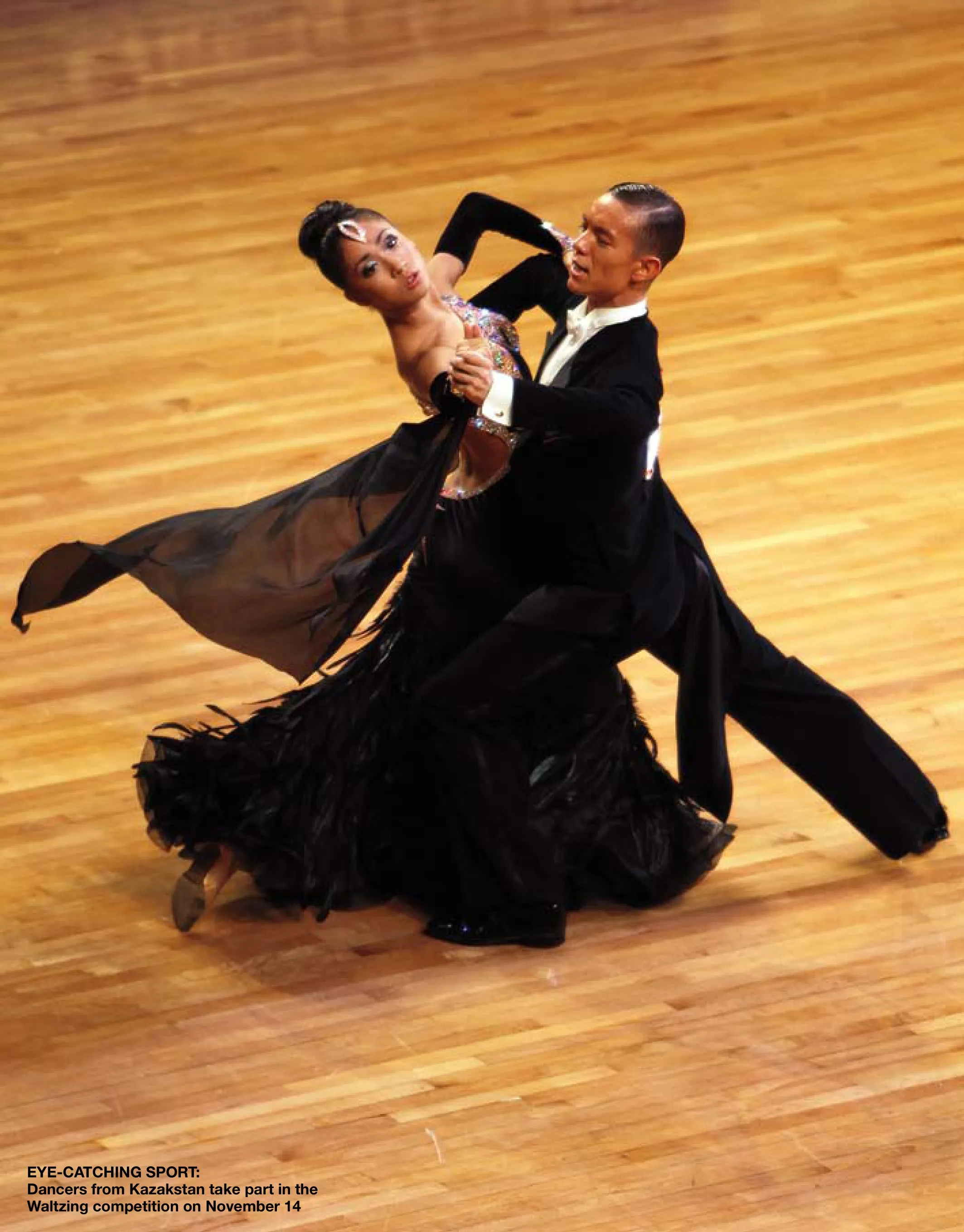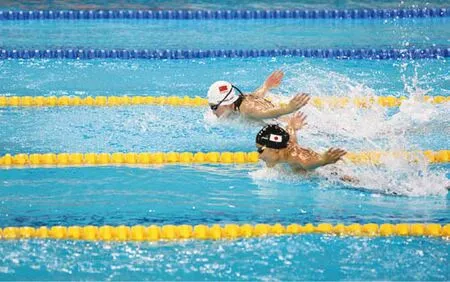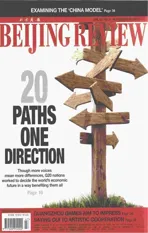Games Beyond Sports
2010-10-14ByYINPUMIN
By YIN PUMIN
Games Beyond Sports
By YIN PUMIN
The Asian Games are not only a sports but also a cultural gala
Twenty years after the 11th Asian Games were held in Beijing in 1990, the sports gala again came to China, putting Guangzhou, south China’s Guangdong Province, in the host position.
With the theme of “Thrilling Games,Harmonious Asia,” the 16th Asian Games,running through November 12-27, attracted more than 14,000 athletes and of fi cials from 45 countries and regions to the city to compete.
On a continent inhabited by nearly two thirds of the world’s population, the Asian Games have become Asia’s largest sports event and a symbol of unity between different cultures, politics and religions, said Sheikh Ahmad Al-Fahad Al-Sabah, President of the Olympic Council of Asia.
An opportunity
The Chinese people are trying their best to present a sports gala that re fl ects the concept of harmony, a green Earth and civilization.
Guangdong built and renovated 70 stadiums and gymnasiums, including 53 competition and 17 training venues. Twelve of the 70 were built from scratch, said Zhang Guangning, Vice President of the Guangzhou Asian Games Organizing Committee(GAGOC).
The air and water quality in Guangzhou has been improved, its transportation system updated and barrier-free facilities put in place.Some 600,000 volunteers are going all out to ensure a comfortable and safe environment for the audience and athletes.
With these efforts, the city ushered in the largest ever Asian Games, featuring 28 Olympic and 14 non-Olympic sports with 476 gold medals up for grabs.
Since the ninth Asian Games in 1982,China has dominated the medal rankings. In 1990, China won 183 gold medals from the Beijing Asian Games. At the last Asiad, in Doha, Qatar, China claimed 165 gold medals,88 silver and 63 bronze.
In order to continue shining at the Games,China sent a record delegation of 1,454,including 977 athletes, to compete in 447 events in 41 sports, except kabaddi.
The Chinese athletes included 35 Olympic champions. But most of them, accounting for two thirds, did not take part in the 2008 Olympics nor the Asian Games held four years ago in Doha.
“We hope to spot young talent at the Asian Games and prepare them for the 2012 London Olympics,” said Duan Shijie, head of the Chinese delegation.
“The Asian Games are not just a sports gala to win as many gold medals as possible for us any more,” said Duan,also Vice Minister of the State General Administration of Sport. “It’s a platform to exchange friendship as well as show the world that great changes are taking place in Chinese sports.”
The of fi cial said the Asian Games would also provide a good opportunity for of fi cials and coaches to see how sports are developing internationally.
“Some of our traditional training systems are out of date. We should learn from other countries and regions and improve our systems,” Duan said. “It’s not about having more athletes involved in intensive training any more. Sport is more about the proper use of knowledge and technology.”
Duan said China is good at sports such as table tennis and badminton, but lags far behind internationally in swimming, track and fi eld, and team sports.
“Ball games, such as soccer and basketball, are more dif fi cult to handle because they need more complicated and systematic training systems. They need more people to get involved in different ways,” Duan said.“We need breakthroughs in those sports to balance our development toward a sports powerhouse.”

JIANG XIAOYING
A cultural gala
At the invitation of organizers, artists from 25 countries and regions gathered in Guangzhou on the night of November 15, along with the Shenzhen Symphony Orchestra, to present a unique multicultural concert re fl ecting the traditions and culture of the participating countries.
Apart from sports, the Asian Games are also a platform for different cultures to showcase themselves, said Chen Chunsheng,Deputy Director of the GAGOC’s Cultural Events Department.
A boat parade along the Pearl River before the opening ceremony of the Asian Games on November 12, as well as performances on the riverbanks of traditional Guangzhou drumming, lion dancing and many other events, showed athletes and of ficials the natural and urban life of Guangzhou.
There will be a total of 317 sessions of 38 programs presented as an Asian Games cul-tural campaign by more than 2,000 artists from 20 countries and regions from November 8 to December 19, according to Chen.

Numerical Differences
The performance program includes well-known plays from Asian countries and regions as well as local plays from the host city. They will showcase diversi fi ed cultures in Asian countries and regions and offer a platform for cultural communications.
Charming Asia is part of the big cultural feast. It presents performing arts from various Asian countries that Chinese audiences will have rarely seen before.
At the Lingnan Convention Hall in Guangzhou, Syrian Sufi musician Nourredine Khourchid and his “Whirling Dervishes” group share the same stage with Christian singer Ghada Shbeir from Lebanon.
Meanwhile in the Huanghuagang Theater, the Royal Ballet of Cambodia stages a show based on a Khmer mythical love story between the half-bird, half-woman Monorea and prince Preah Sothun.

JIANG XIAOYING

FLYING FISHES:Chinese and Japanese swimmers compete in the women’s 4x100-meter medley relay on November 14
“I’m honored to be here. I think this program shows both the unity and variety of Asian arts. Sharing the stage with artists from so many different countries is an amazing experience for me,” said Reem Kelani, a Palestinian singer who performed at the fi rst concert of the series on November 8.
It is the first time the whirling dervish dance of Islam’s Sufi tradition has been staged in China.
Originally a religious ritual, the dance of the whirling dervishes involves continuous whirling and is said to represent a mystical journey of man’s spiritual ascent through love to perfection.
“We may have different cultural backgrounds, but we share the same love for life,”Khourchid said. “The Asian Games have provided a great platform for culture and arts.”
This is the second tour for the Royal Ballet of Cambodia; the fi rst was 51 years ago.
“Each country has its own traditions.What we are presenting here is a dance style with eight centuries of history,”said Norodom Buppha Devi, princess of Cambodia and director of the troupe.
Besides, there will also be 79 exhibitions held during the period. Most tickets to these performances and exhibitions are being given out to residents of Guangzhou communities free of charge.
“Nowadays, large-scale events have become the best platforms for culture. Just like the World Expo is not only about novel technology, the Asian Games are not only about sports,” said Lin Jian, Director of Charming Asia. “For Chinese people, such events are good starting points to get to know more about other cultures.”
(Miao Xiaoyang contributed reporting in Guangzhou)
